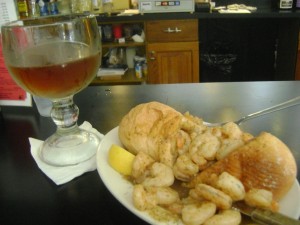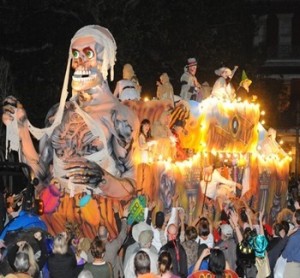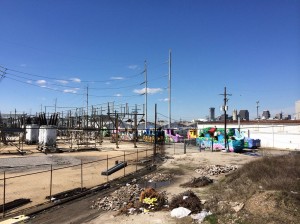5) DIETARY DISTRESS
 I am utterly shocked no one noted the absence of food from my list of Things I Miss about New Orleans. Don’t get me wrong, I love Cajun and Creole cuisine and some of the greatest restaurants I’ve ever visited are in New Orleans. But there’s a reason why Louisiana leads the nation in obesity and diabetes. It’s great vacation indulgence, but after a year I had put on forty pounds and was craving a more nourishing diet, spurring my low carb transition. And when I went low carb, I saved tons of money because I more or less gave up eating out. Yes, it is possible to exercise and eat healthy in NOLA, but neither is strongly socially supported so you’re swimming upstream. Certainly you can blame this on a lack of self-control (and when it comes to food, I admittedly struggle) but it’s also easy to overlook the subtle but overwhelming pull of social pressure. Although subtle in execution, it’s hard to resist a waxing tide; similarly, I find it easier to exercise and eat well in Florida. I just do.
I am utterly shocked no one noted the absence of food from my list of Things I Miss about New Orleans. Don’t get me wrong, I love Cajun and Creole cuisine and some of the greatest restaurants I’ve ever visited are in New Orleans. But there’s a reason why Louisiana leads the nation in obesity and diabetes. It’s great vacation indulgence, but after a year I had put on forty pounds and was craving a more nourishing diet, spurring my low carb transition. And when I went low carb, I saved tons of money because I more or less gave up eating out. Yes, it is possible to exercise and eat healthy in NOLA, but neither is strongly socially supported so you’re swimming upstream. Certainly you can blame this on a lack of self-control (and when it comes to food, I admittedly struggle) but it’s also easy to overlook the subtle but overwhelming pull of social pressure. Although subtle in execution, it’s hard to resist a waxing tide; similarly, I find it easier to exercise and eat well in Florida. I just do.
4) PRIDE IN PREJUDICE
 Wow. Race is a tough one, and in its typically paradoxical way New Orleans is both the least and most racist place I’ve ever lived. This stretch backs to its very founding. On one hand the city was known for having some of the most brutal slave markets in that nation serving the sugar plantations in the surrounding delta which were a death sentence for workers (2 years was a long life expectancy in the cane fields, thus getting ‘sold down the river’ is a threat and not promise of southern leisure). On the other hand, the city itself had the most permissive slave laws in the new world and was the only city where slaves could congregate freely on Sundays, thus Congo Square and the eventual birth of jazz. Plus, New Orleans always had a sizable free black population that experienced significant social and economic mobility.
Wow. Race is a tough one, and in its typically paradoxical way New Orleans is both the least and most racist place I’ve ever lived. This stretch backs to its very founding. On one hand the city was known for having some of the most brutal slave markets in that nation serving the sugar plantations in the surrounding delta which were a death sentence for workers (2 years was a long life expectancy in the cane fields, thus getting ‘sold down the river’ is a threat and not promise of southern leisure). On the other hand, the city itself had the most permissive slave laws in the new world and was the only city where slaves could congregate freely on Sundays, thus Congo Square and the eventual birth of jazz. Plus, New Orleans always had a sizable free black population that experienced significant social and economic mobility.
In the 20th Century blues, and jazz, and R&B bars/bands became beacons of integration and New Orleans is so small and piecemeal that different ethnicities were forced to live and work side by side. Yet segregation in NOLA quietly maintains on a block-by-block basis and this proximity often spurs bitter undercurrents.
Southerners often fairly complain that the south gets criticized for being more racist when most northern cities actually display greater segregation–it’s just impolite to talk about these unspoken attitudes that quietly but effectively divide neighborhoods. Does this make the north less racist or just more disingenuous?! Recently the producer and star of NPR’s State of the Reunion, an African-American (coincidentally from Jacksonville), visited Portland, Oregon and was surprised by the amount of racism he encountered. Apparently crusty, progressive, hippy Portland is very, very white, and prefers to keep it that way. (Then again, the National Guard never had to protect little girls from a mob of violent white men in Portland, so it’s complicated!)
So where does that leave NOLA? A paradox for sure. On one hand I’ve never been anywhere with such a wonderful and free mix of cultures. So many people of different races and backgrounds working side by side combine to create that synergy that makes New Orleans unique. I’ve also lived nowhere where biting racial comments are so frequently and casually tossed out. And I don’t mean insensitive jokes but statements rife with malice and steeped in genuine loathing. This is certainly not majority behavior, but it’s not uncommon. Does that make the city more racist or more honest? I honestly don’t know, but it is certainly ugly to encounter.
3) THE HEIGHT OF FIGHT OR FLIGHT
Enough is written about crime in New Orleans and I’m not here to pile on. In truth, I felt safer than expected based on alarmist media coverage, though maybe I was just blissfully ignorant. In the end, though, you can’t write off New Orleans’s criminal reputation as a media construct. There is a lot of crime in the city and it often hits close to home: I exited book club at a friend’s home one night to find the street thick with police because a stalker had tried to strangle a neighbor; an armored truck guard was shot and killed at the bank around the corner from my Carrollton home; I had a home health patient who was paralyzed after being shot outside his upscale home; on and on.
I was seldom afraid, but I was always aware. When walking around New Orleans the worst case scenario is always in the back of your mind, and you find yourself constantly scanning for threats. It’s similar to the claustrophobia mentioned earlier. I was seldom conscious of this heightened state of flight or flight, but I could feel myself relax and let down my guard each time the city faded in the rearview.
2) ELATION IN STAGNATION
This is another difficult issue. The magic of New Orleans hinges on preservation and reverence of the past. Culturally, the city does a good of balancing tradition with innovation such as Rebirth and Dirty Dozen mixing traditional brass band spirituals with modern hip-hop rhythms or John Besh and Donald Link infusing modern trends into traditional Creole cuisine. When it comes to government, infrastructure, and services, however, the city is famously deficient. There is no need to document the political corruption and civil insufficiency that plagues the city, though it can be a shock to the system when you first move to town. And this is where it gets weird. My last roommate and I often discussed the odd propensity for locals to not only accept the dysfunction, but to perversely embrace it like fraternity hazing or high school football summer two-a-days. “This is how we do it, so are you tough enough to hang?!”
A trivial example of such poor planning and execution is the streetcar system, which should be a jewel. Instead, its lengthy, poorly executed renovation has rendered it practically unusable. Cars run a few block before forcing everyone to disembark to wait for a bus to carry them three or four blocks past construction only to disembark and wait for another streetcar. Once I tried to utilize this system to avoid driving back from an Abita pub crawl in the CBD and it took me 1:45 minutes to get downtown. I can walk five miles quicker than that—or stumble—so I walked home afterwards rather than running that gauntlet again!
A less humorous example is that attack on a friend’s neighbor. While being choked, the victim managed to kick her attacker and call 911…only to be told it sounded like a domestic dispute before they hung up?!?!? She called back and finally convinced them to dispatch a car, yet when police arrived a good twenty minutes later they went to the wrong house and she had to run on the porch and get their attention so they could come in and begin trampling evidence. I had an insider’s account, so this NOLA.com’s article —as shocking as it is—only tells the half of it.
I still recall an editorial from a large national paper after Katrina responding to outrage over corruption in distribution of relief funds by stating that we’ve always known New Orleans was a little shady: “If you want neat and orderly, go to Salt Lake City,” the author chided. “But you won’t, will you?” True. I don’t think anyone wants New Orleans to be that precocious child who primly recites Bible verses in his stuffy Easter sweater to the delight of the adults in the pews. Sometimes, though, it can be a little hard to swallow when locals act like proud parents as the city holds up the entire check-out line at Wal-Mart while crying on its belly and pounding the floor. The city has so much beauty and richness to be preserved and protected, yet it feels like none of its real and potentially lethal deficiencies will ever be addressed if everyone is worn down to the point of ironic acceptance. It is difficult to say where this line should be drawn, but it is certainly a frustrating conundrum.
1) A PROFUSION OF EXCLUSION
This was the most puzzling and disheartening roadblock of my journey. I can typically get along with just about anyone and have been blessed with a core of close friends everywhere I’ve ever lived. Nevertheless, I’m a bit of an odd-shaped puzzle piece so whereas some people can carve a niche in any crowd, it takes me time to discover where I fit in.
Moving to New Orleans, I (rather naively in hindsight) hoped that perhaps I’d naturally stumble upon a cadre of like-minded souls, though I didn’t always feel this way. When I first fell in love with NOLA in 1998 my father was convinced that I would eventually move there. I disagreed. New Orleans was my sacred escape and I feared that migrating with problems in tow would pollute the magic; however, in 2012 with my life was in a mini-tailspin I came back to life at Jazz Fest with a daiquiri in hand and second-line towel in the air. As I danced with abandon my Jacksonville friends who’d grown up in New Orleans suggested I move there. They were convinced I’d fit right in and, through their friends, inherit a ‘built in social network.’ Other locals I knew agreed, so I took the plunge. Instead of fast friends, though, I encountered more than a few people who were suspicious of my motives.
I’ve never encountered this elsewhere. It’s a free country. People come and go. In New Orleans, though, that protectionism I’ve spoke about above extends to migration, especially after Katrina. This was not universal, but those early kindnesses mentioned in the ‘things I miss’ post meant so much because they weren’t always readily encountered. Visit New Orleans to throw down cash and you will be greeted with unrivaled southern hospitality. Move there and many will question your motives and worthiness.
For example, when I told a NOLA born-and-bred friend about interviewing a very successful author from New York who’s lived locally at least twenty years, he spat out a tirade of obscenities, accusing the writer of “exploiting my @$%*ing city.” Twenty plus years and he still doesn’t have the right to participate?!? This was the first but not last time I’d encounter this puzzling sentiment. I understand suspicion of venture capitalists and real estate developers who want to plow under the French Quarter and erect Disney Lagniappe, but it is my belief that art only enhances, never exploits. Yet at one point some crazy stranger submitted a comment to my blog telling me to “take my @#$#@ing Jimmy Buffett ass back to Florida and quit exploiting my @#$#@ing city.” Again, that word ‘exploit.’ I can’t imagine moving to New York to write and anyone being shocked. I don’t imagine they’d be particularly accommodating, but rather shrug and say, “Of course you moved to New York. It’s New York. Now good luck, loser!”
New Orleans is harbors an undercurrent of insecurity—for good reason—that its culture contributions are often overlooked and undervalued. Yet, if you want to be a cultural center you have to embrace an influx of ideas. New York (and the U.S. for that matter) didn’t become great solely through home-grown talent but through attracting the best. But in this city not known for industriousness, some folks seem afraid that instead of spurring a rising tide competition will just make it harder to reach (not too strenuously) for that brass ring.
The most bizarre example of this came through my dealings with Offbeat magazine. Before I moved to town, the editor accepted my pitch to interview Kevin Griffin of Better Than Ezra about Krewe of Rocckus. I was surprised and thrilled at this early success, but later received a cryptic email stating she shouldn’t have offered me the closing Backtalk section and would have to move the piece to the inner fold (as if I cared where it appeared! Click here to read) After a couple of months of unreturned calls and emails, I stopped by and discovered that she had left under contentious circumstance. Even though the new editor lit up and commented that my interview was ‘a good piece,’ I left under the growing impression that my ‘intrusion’ into their pages hadn’t been welcome. Eventually he accepted my pitch to do a feature on up-and-comer Robin Barnes, but after I’d turned in the rough draft he too responded that he shouldn’t have promised me a feature and instructed me to cut it down to a 400 word blurb—no photo.
I was dejected and embarrassed having to renege on my promise to Robin and her publicist, but kept my chin up and quickly turned around the shorter piece. Through a twist of luck, a few weeks later the organizer of Satchmo Summer Fest dropped by the magazine hoping to coordinate a feature. Offbeat, though, didn’t want to repeat a story on someone recently profiled, so when Robin’s name popped up my 400 word blurb instantly morphed back into a 2000 word feature (click here to read!). Although it meant writing the piece a third time, all’s well that end’s well. Two weeks after Offbeat hit the streets this artist that hadn’t been on their radar landed the cover of New Orleans Living, and every major publication in town soon picked her up. Offbeat was so impressed they hired her to perform at their annual awards show. And I had helped them get her first.
So of course I hit a brick wall.
I get ‘paying your dues,’ but every time I whipped out my metaphysical credit card it kept getting unceremoniously declined. I even tried attending the awards ceremony, but when I approached the owner to politely and cheerily introduced myself, mentioning that I’d written a couple of pieces for her, she looked me over with a sneer. “Sarrett? I know who you are.” She spoke a few more words without ever making eye contact and I left feeling like a leper breaking quarantine.
In the end, I am grateful to have the two pieces on my resume and don’t want to sound like sour grapes. It was just puzzling. Maybe I misinterpreted the whole scenario. But I’ll never know because no one was talking—which is very New Orleans.
I also tried reaching out to other bloggers, including another former Offbeat editor, but no one seemed keen for collaboration. One blogger agreed to trade links so I wrote a post about her website only to have her decline to reciprocate. I was shot down cold by other traditional krewes until Morpheus so graciously invited me to join. (Though I knew cracking a krewe would be tough.) Even joining the open membership Chewbacchus was a challenge at first, though I eventually made some great friends and had perhaps the best experience of my adventure walking with their krewe. Still, I have been excluded many times throughout my life for being a nerd, but this was the first time I ever felt marginalized on occasion for not being nerd enough!
As I’ve mentioned, I met many kind and generous people too and it’s not realistic to expect people to easily open up to strangers. And, again, I’m admittedly not a skilled smoozer, so I bear my share of blame. But there is a surprising tendency amongst many locals to view newcomers as invaders. When approaching people I always try to ‘offer’ before I ‘ask for,’ but was surprised to often find this perceived as manipulative rather than generous. Things would surely have gotten easier if I’d stayed longer and ‘paid more dues,’ but as I get older I find myself less willing to waste years trying to win people over. In the end it doesn’t matter. Whether my own personal failing or a vexing cultural propensity, it was the major struggle along my journey.
- One Last Game With The Guys
In the end, any disappointments I had have softened over time, and MYOMG was an amazing experience I haven’t regretted for a second. In the words of that great poet laureate of Haire-de-Metalle, “Every rose has it’s thorn,” so enough dwelling on the negative. Mardi Gras 2015 is in full swing and I’m stoked about returning in two weeks to dive back in. Let the good times roll!
NEXT ARTICLE





